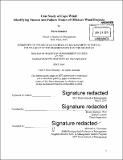Case study of Cape Wind : identifying success and failure modes of offshore wind projects
Author(s)
Dennery, Pierre
DownloadFull printable version (6.234Mb)
Other Contributors
Sloan School of Management.
Advisor
Henry Birdseye Weil.
Terms of use
Metadata
Show full item recordAbstract
Cape Wind was supposed to become the first offshore wind farm in the United States. In 2015, more than 10 years after its inception, a single turbine has yet to be produced and the project is at a dead end. Facing a strong local opposition, it has suffered numerous setbacks that eventually led to huge delays affecting its timeline. Understanding what happened in this particular project and what could have been done differently could help the industry go forward with new plans to develop offshore wind in the United States. In this paper, we have built a System Dynamics model to simulate the dynamics of support, opposition, financial certainty and technology that can affect an offshore wind farm during its approval process. We show that contrary to a common idea, the relatively lower environmental awareness fifteen years ago was not a major cause for the to date failure of Cape Wind. Rather, it is the level of advocacy against the project at its beginning that has the most impact on its overall timeline. Major efforts should therefore be devoted to defuse the most vehement opponents right from the beginning, rather than trying to convince more people to support it. We also show that changes in plans during the approval process to increase its NPV can have a strong impact on the project timeline. Lastly, contrary to our hypothesis, we see that a regulatory framework doesn't necessarily mean a faster approval process.
Description
Thesis: S.M. in Management Research, Massachusetts Institute of Technology, Sloan School of Management, 2015. Cataloged from PDF version of thesis. Includes bibliographical references (pages 50-53).
Date issued
2015Department
Sloan School of ManagementPublisher
Massachusetts Institute of Technology
Keywords
Sloan School of Management.